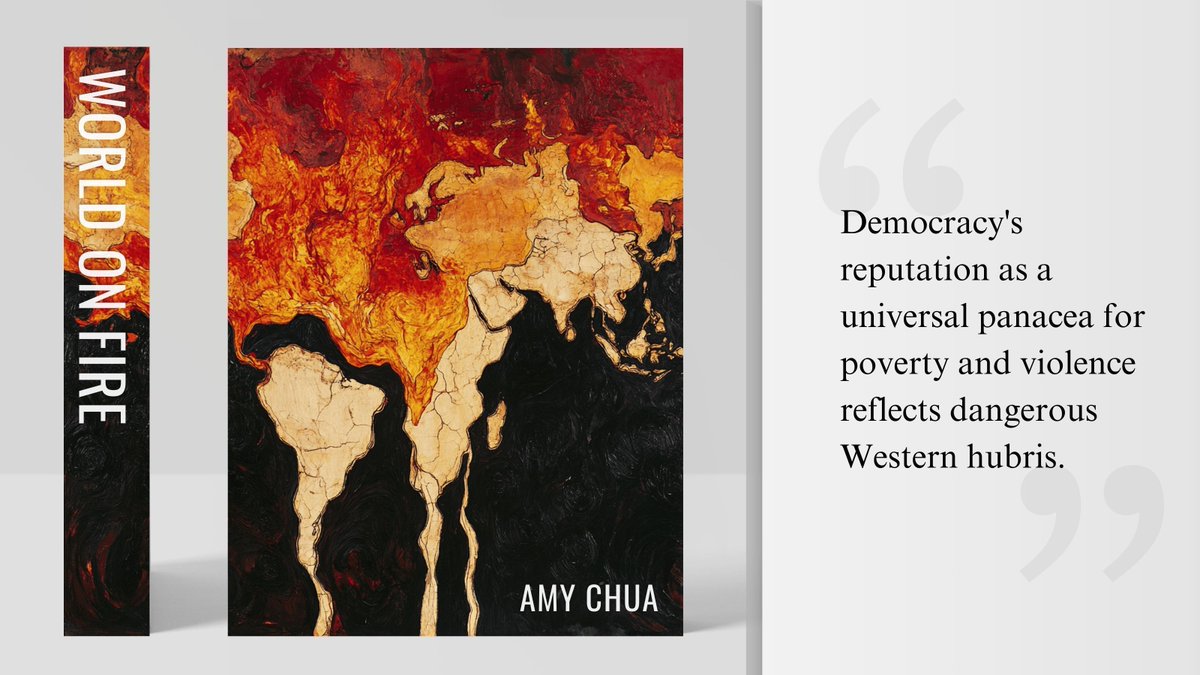We're still reeling from the implications of our library's latest addition. Let's dig in.
As the world's staunchest defender of democracy nears Election Day, Amy Chua's "World on Fire" is the perfect contemplation on why Western democracy is more a unicorn than the standard.
1/
As the world's staunchest defender of democracy nears Election Day, Amy Chua's "World on Fire" is the perfect contemplation on why Western democracy is more a unicorn than the standard.
1/

20+ years after publishing, as intellectuals everywhere still tout the democratic salve, it's clear not enough people were listening. The Yale professor who popularized the "Tiger mom" archetype gifts us a lesser-known and arguably meatier concept: "market-dominant minorities"
2/
2/

Across the developing world, ethnic minorities control most wealth while majorities live in poverty. These ethnic minorities disproportionately profit from free markets, only to face persecution on the heels of democracy. How did we get here? In short: Western ethnocentrism.
3/
3/
Developing countries were urged (when not coerced) to first adopt free markets. When this naturally led to market-dominant minorities and civil unrest, democracy was hastily implemented. Indeed, the road to hell is paved with good intentions.
4/
4/

Pressure mounts and eventually explodes, usually into 3 kinds of backlash: the majority uses their votes for revenge, the minority allies with dictators for protection, or violence erupts. Democracy + market concentration = dangerous cocktail.
5/
5/
Chua offers a litany of case studies. From the Chinese in Indonesia and Burma, to the Lebanese in Sierra Leone and Tutsi in Rwanda, to Jewsish oligarchs in Russia — themes persist: market dominance, asset seizure, violence, and economic depression.
6/
6/
Like in Rwanda, elite minorities aren't necessarily foreign. Relatedly, the significant admixture from European colonialism in Latin America manifests as a "pigmentocracy" today, where lighter-skinned elites rule. Ethnic divisions more closely follow class than heritage.
7/
7/

There is an exception, although its methods questionable. Thailand opted to forcibly assimilate its elite Chinese minority through banning schools & businesses. But, it's pertinent to note that shared heritage likely helped, and stability is not guaranteed.
8/
8/
It's fascinating to evaluate the theory's predictive power. At publication, Zimbabwe had seized white-owned farms. After agricultural collapse, hyperinflation, and food shortages, the once-breadbasket of Africa is now inviting back those same farmers with 99-year leases.
9/
9/

The Israel-Palestine escalation also resonates. Chua explains how Israel is a regional market-dominant minority, and the Middle East is a prime example of the democratic fallacy — monarchies often prove more moderate than their anti-Israel fundamentalist populations.
10/
10/
Not mentioned by Chua but remarkably applicable is another market-dominant minority created by policy — but not free markets. In Islamic societies, the Jizya tax pushed poorer Christians to convert, inadvertently selecting for a wealthy Christian elite.
11/
11/
The West is by no means exempt. In Post-Civil War USA, the South saw whites restrict voting of the black majority. In impoverished Weimar Germany, a disproportionately successful Jewish 1% was used by Nazi ideology to ultimately enact the horrors of the Holocaust.
12/
12/

America is now the world's market-dominant minority, with 4% of the population and an astronomical share of wealth & power. When McDonalds is in 114 countries but half the world lives on $2/day, that gap breeds anger. 9/11 wasn't just about poverty - it was about humiliation.
13/
13/
Democracy in the West didn't develop overnight. It took centuries of evolution and growing pains along the way. The solution isn't obvious. While distribution plays a role, voluntary wealth sharing may be the most direct method of countering resentment.
14/
14/
But what about the zero-sum fallacy? Zimbabwe exemplifies how elite gain doesn't necessitate majority loss. But as with Latin America, these matters are perspective. And based on Thailand, homogeneity lessens these embittered perceptions. Perception becomes reality.
15/
15/

The iPhone didn't exist in 2002. Today's social media creates a global consciousness unimaginable back then. We've even survived a global pandemic. How do perceptions of inequality change when one corner of the world is constantly connected to the other?
16/
16/
Increasing immigration is also shifting Western demographics, particularly in Europe. Chua's thesis seems unequipped for this scenario. Can Western democracy survive an indigenous market-dominant minority, as is the trajectory in parts of Europe? It is a unicorn after all.
17/
17/
"World on Fire" is a rare work for its indirect probe into virtually every area of policy relevant today. Chua's ability to approach sensitive topics with honesty and objectivity is unmatched, and makes you wonder what we could achieve if more people followed suit.
18/
18/
We highly recommend checking out the "World on Fire" short, available now in the library.
If you're new here, you can use 'ELECTION24' for 10% off your subscription.
liegent.com
If you're new here, you can use 'ELECTION24' for 10% off your subscription.
liegent.com
• • •
Missing some Tweet in this thread? You can try to
force a refresh






